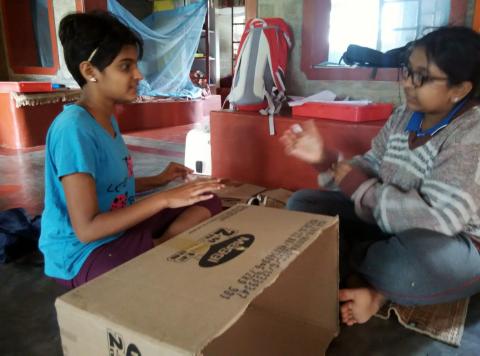
Helpmate on Fridays is like community coming together to grow emotionally! This typically starts with an event which troubled someone or an action which someone is feeling unsafe. And This typically ends up with an insight, a tool or explaining thinking beyond obvious. And most insights comes from children!
Last two days, two incidents where a facilitator screamed at the group of kids in anger (yes, we do get angry!)
Thoughts expressed
- No doubt we are not doing anything correct, but raising voice is fearful
- Is there image, that I am good child and cannot be scolded in public?
- Each one takes scolding differently.
- May be there is an image that adults are scary, so if an adult screams in Aarohi, one can get intimidate.
- If one continue to do the same thing, other has the right to raise voice.
- How does one want to be communicated when this has are either repeating or dangerous?
- Say it in less screaming way
- Say on one to one basis, have a serious talk.
- Feel completely put down, if it repeats bring in helpmate and my voice
- Zone out and wonder what I did ( self reflection). Fine with screaming
- Bring it to community
- Sometimes I feel it’s unnecessary, but it makes me aware so I am fine with any scream
- I think and reflect – it helps me
- I can express later
- Gentler way would be better, I don’t like screaming
- When one gets scolded it feels bad, who gets hurt but what about we doing to others? Instead of getting overwhelmed, share.
- I loose out on certain behaviour not on any person, most cases bring understatnding.
- Count ten seconds and analyse, say sorry or keep quite
- Discuss nicely, when not listening rules screams.
- It starts with gentle, repeated reminders, but not understand what is happening to others, sometimes we ( adults) can go wrong.
- If I get scolding in very loud way I don’t like, mild way is okay.
- Reflect on self and then react.
- Understand others point of view, one has to make a point. It feels bad but I need to understand why someone took that mode.
- It’s okay to communicate like this
- If from parents then I scream back or not to. But new person, then I don’t understand what the other person going through and the person don’t know what. I am going through.
- if Children can scream at each other why not adults?”
As we all expressed we realized that somewhere the “onus” is on “adults (facilitator) to reach out to the kids
- If kids scream, adults to connect with kids to listening
- If adults scream, even then adults to reach out to the kids for listening
Ah! something is not balanced here! “why kids not reach out to others (adults or peers or parents ) and express their feelings? Can this be an skill one can explore “how do I go and express my feelings to anyone. It’s whose responsibility to take initiative to express? OR waiting others to reach out to express and listen? ”
One child asked “can we bring Norray for adults? Question was “who is creating this gap and difference? Kids don’t’ listen to kids – are they creating this difference and continuing to create difference?”
We ended the session with drawing our garden of Life….Imagine the garden of your life (guided visulaization)
- What you want to be in the garden? ( except a human being).
- Imagine your strength, you want your strength to be brighter or pastels
- Draw your own images
- Add dreams in your garden – relate to the object.
- Add your feelings to the garden
- Add your disturbances, not helping you to grow
- What different people in your garden are – community, peers, parents, teachers?
- Add your feelings, Images about different people in your garden…connect with each other and draw them in your garden!
We can create the awareness
We can introduce various tools
But we cannot impose our learnings on anyone
As we all travel our own journeys!
The platform of helpmate is just a medium to offer the art of “expression”.